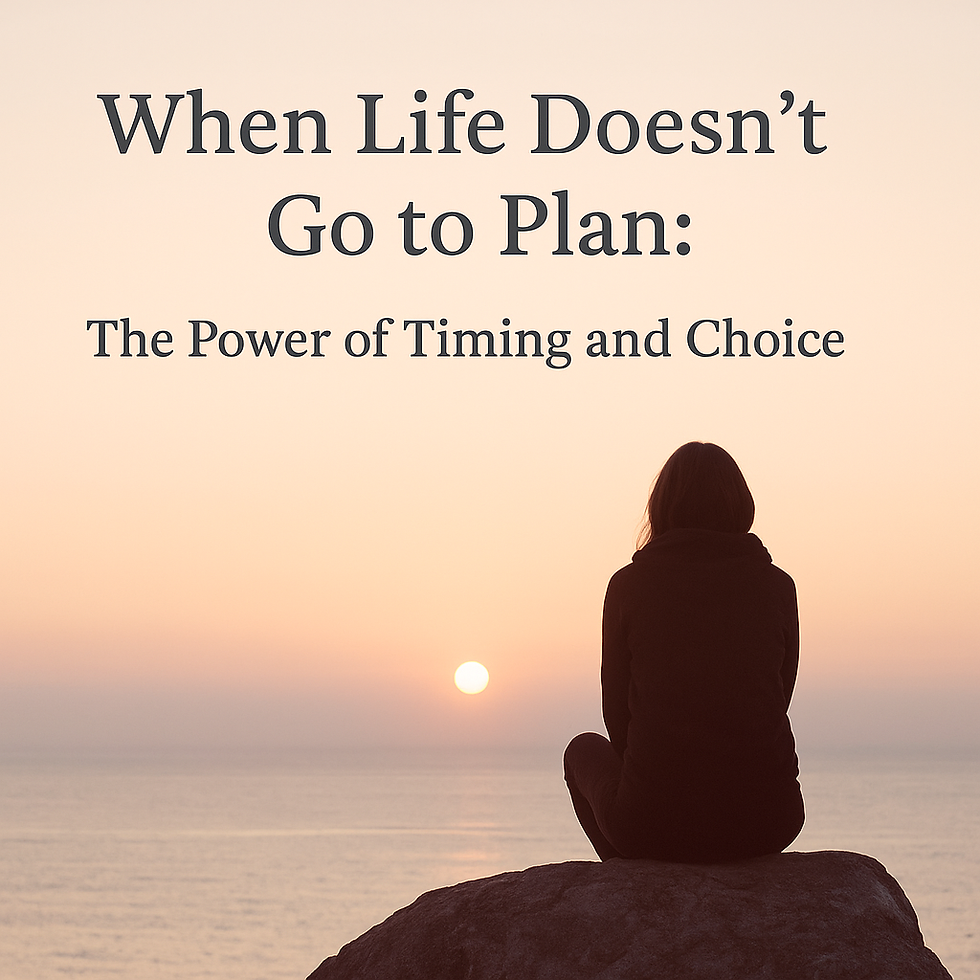What Are You Choosing to See?
- United-in-Separation
- Apr 21
- 4 min read

Life presents us with endless choices; choices about what we see or focus on, how we react, and what meaning we attach to the events around us. We decide whether to perceive beauty or imperfection, connection or division, peace or conflict. And how we react or respond truly matters.
Imagine sitting by a window in the countryside. Outside, the world is full of life and colour - the sun on the horizon, trees swaying and birds soaring. However, on that same window, are bird droppings. Do you admire the breath-taking view or fixate on the unsightly poop on the glass?
This simple analogy applies to how we view people’s actions, our situations, and even ourselves.
Recently, an old friend of mine called to meet up. After exchanging pleasantries, I asked how she was really doing, knowing she had been struggling in her relationship. She said her husband had accompanied her to one of her events in London, but they had a big argument afterwards.
‘He never wants to attend my events… He is typically not interested in social gatherings… He brought flowers and was suddenly the one everyone wanted to talk to. I listened curiously, then I asked, ‘What was it you were upset about? Him, accompanying you or him, getting the attention meant for you?’
With slight disgust on her face, she answered me with, ‘Am I talking with my friend or a coach?’ We both laughed.
‘You always ask questions that I don’t want to answer,’ she continued. I responded by asking, ‘Is that not why you are here with me instead of exploring London with your hubby?’.
A deafening silence followed. ‘I have been so angry and upset with him recently. We argue about everything nowadays.’ She broke the silence and sipped some wine. I reminded her of something she told me a couple of years ago about her husband. He had social anxiety.
Right then, she admitted to believing that he still does. I had to ask her, ‘Did you acknowledge his effort to show up to your event despite his difficulties, as it appears that he left his comfort zone, even giving you flowers in public, because that's what you like?
The Power of Perspective
Our focus shapes our emotions, our relationships, and ultimately, our lives. We are bound to get frustrated occasionally, especially when we feel our needs are not being met. It is difficult to forgive and forget, as situations are likely to repeat themselves if there is no full acknowledgement of wrongdoing and conscious efforts to put things right. These efforts must not be overlooked.
If we consistently choose to magnify flaws, shortcomings, and past grievances, we create a reality filled with frustration and division and we will miss the beauty of life. If we choose to see the effort behind an imperfect action, the strength in vulnerability, the possibility of resolution over resentment, our world begins to shift.
As in my friend’s scenario, I could not help but wonder why, when someone takes a step toward kindness, we sometimes fail to acknowledge their effort or we choose to point out what they could have done better, especially if we are hurt by their mistake.
So, I ask you:
- When a loved one makes a mistake, do you see their humanity, or do you hold onto resentment?
- When facing a challenge, do you recognise your resilience, or do you dwell on the difficulty?
This isn’t about ignoring problems or pretending everything is perfect. It’s about deciding whether we spend our energy fostering understanding or fuelling conflict. Do we look for reasons to build bridges, or do we collect reasons to tear them down?
Choosing Peace Over Conflict
Just as we can choose what to see, we can choose how to respond. Conflict is inevitable; however, we can meet it with defensiveness and blame, or we can be curious and compassionate. We can choose to escalate the conflict or choose to de-escalate it.
I asked my friend, ‘Can you remember telling me what attracted you to your husband when you first met?’. She smiled and I continued, ‘You said he was an introvert, unlike you, who feels comfortable being the centre of attention’. I remembered, back then, she would even joke about this being great, since one of them had to be the calm and sensible one.’
Then I asked her to do a quick character check of what she was struggling with, followed by ‘BUT’, for positive affirmation. This is a ‘reframing technique’ I use in coaching. She said that her husband is too quiet but hardworking, too rigid in his thinking, but focused. I responded by rephrasing her own words, 'he is organised and caring; you are chaotic. You act before thinking; he thinks before acting. And we both burst out laughing, with tears of joy.
As I downed my remaining drink, I asked her to reflect on two questions: (1) What are you focusing your attention on in your relationship? (2) What are you going to do about your current situation?
These choices matter in all relationships and everyday interactions. Do we focus on what truly matters - understanding, cooperation, and peace? If we choose to look for faults, we’ll find them. If we choose to look for goodness, we’ll find that too.
My message here is simple. There is hope in most relational issues. Nevertheless, nothing justifies abusive behaviour.
So, I ask again, what are you choosing to see today?
By: Chris Kolade
Principal Consultant
United-In-Separation®




Comments